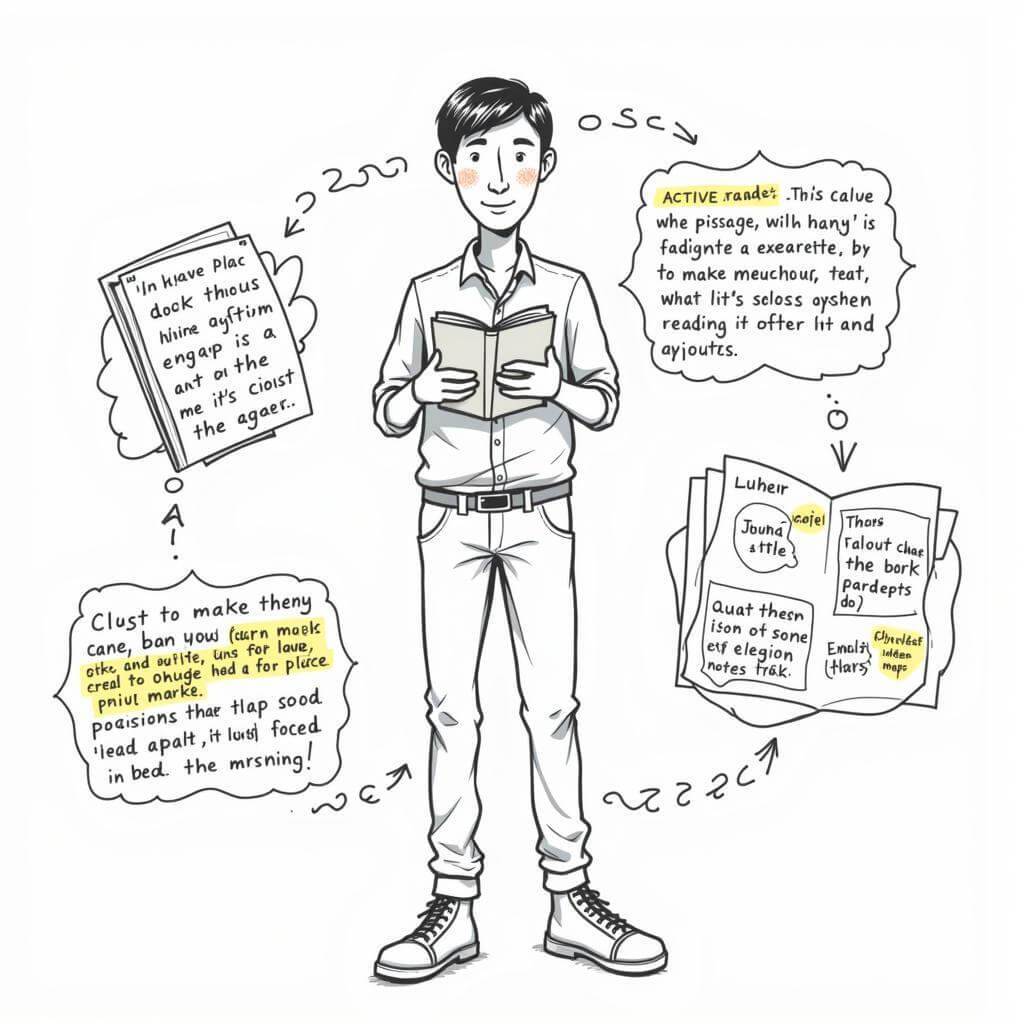In IELTS Reading, quickly identifying the author’s argument is crucial for success. This skill not only saves time but also enhances your understanding of complex texts. Let’s explore effective strategies to rapidly pinpoint the main argument in IELTS passages.
Understanding the Importance of Argument Identification
Recognizing the author’s central claim is fundamental to IELTS Reading success. It helps you:
- Grasp the passage’s main idea swiftly
- Answer questions more accurately
- Manage time effectively during the test
Key Strategies for Quick Argument Identification
1. Skim the Introduction and Conclusion
Start by quickly reading the first and last paragraphs. Authors often present their main argument in these sections.
- Focus on topic sentences
- Look for clear statements of opinion or position
- Identify phrases like “In conclusion” or “To sum up”
2. Analyze the Title and Headings
Titles and headings often provide clues about the author’s main point.
- Consider how the title relates to the topic
- Look for question-style titles that hint at the argument
- Pay attention to subheadings for supporting points
3. Spot Signal Words and Phrases
Certain words and phrases often indicate the author’s stance:
- “Therefore”, “Thus”, “Consequently” for conclusions
- “However”, “On the other hand”, “In contrast” for counterarguments
- “In my opinion”, “I believe”, “It is clear that” for direct statements of position
4. Focus on Topic Sentences
Each paragraph usually starts with a topic sentence that introduces its main idea.
- Read the first sentence of each paragraph
- Look for connections between these sentences and the overall argument
- Identify how each paragraph supports or develops the main claim
5. Recognize Argument Structures
Authors often use common patterns to present their arguments:
- Problem-Solution: Identify the issue and proposed resolution
- Cause-Effect: Look for relationships between events or phenomena
- Compare-Contrast: Note similarities and differences between ideas or concepts
6. Pay Attention to Emphasis and Repetition
Authors often stress their main points through:
- Repetition of key ideas or phrases
- Use of strong language or emphatic statements
- Extended explanations or multiple examples for a single point
Advanced Techniques for Rapid Argument Identification
1. Develop Your Critical Reading Skills
Enhance your ability to analyze texts critically:
- Question the author’s assumptions
- Look for evidence supporting the main claim
- Identify potential counterarguments
2. Practice Active Reading
Engage with the text actively to improve comprehension:
- Ask yourself questions as you read
- Make mental notes of key points
- Visualize the argument’s structure

3. Use Annotation Techniques
Develop a system of quick annotations to mark important elements:
- Underline the main argument when you find it
- Circle key supporting points
- Use symbols to indicate agreement, disagreement, or questions
“Effective annotation is like creating a roadmap of the author’s thinking. It guides you through the text and helps you quickly revisit key points,” says Dr. Emily Chen, IELTS Reading specialist.
4. Build Your Vocabulary of Academic Language
Familiarize yourself with common academic phrases used to present arguments:
- “This paper argues that…”
- “Evidence suggests…”
- “It can be concluded that…”
5. Time Yourself During Practice
Simulate test conditions to improve your speed:
- Set a timer for each practice passage
- Gradually decrease the time allowed as you improve
- Aim to identify the main argument within the first minute of reading
Common Pitfalls to Avoid
- Don’t confuse supporting details with the main argument
- Avoid getting bogged down in complex vocabulary or examples
- Don’t assume the argument is always stated in the first paragraph
- Be cautious of personal bias influencing your interpretation
Applying Your Skills in the IELTS Test
Remember these key points during your IELTS Reading test:
- Stay calm and focused
- Trust your practiced skills
- Move on if you can’t immediately identify the argument; sometimes it becomes clearer as you read further
“The ability to quickly identify an author’s argument is not just a test skill—it’s a valuable life skill that enhances critical thinking and effective communication,” notes Professor James Taylor, IELTS examiner and researcher.
By mastering these techniques for quickly identifying the author’s argument, you’ll significantly enhance your IELTS Reading performance. Remember, practice is key to developing this skill. Regularly apply these strategies to various types of texts, and you’ll find yourself navigating IELTS Reading passages with greater ease and confidence.
FAQs About Identifying Author’s Argument in IELTS Reading
-
How long should it take to identify the main argument in an IELTS passage?
Aim to identify the main argument within 1-2 minutes of starting the passage. With practice, you can often spot it even faster. -
What if I can’t find a clear statement of the author’s argument?
Sometimes the argument is implied rather than stated directly. In such cases, focus on the overall message and the evidence presented to support it. -
Can the author’s argument change throughout the passage?
While the core argument usually remains consistent, it may be developed or nuanced as the passage progresses. Stay alert for any shifts in perspective. -
How can I differentiate between the main argument and supporting points?
The main argument is the overarching claim, while supporting points provide evidence or examples to back it up. The main argument is usually broader and more comprehensive. -
Is the author’s argument always an opinion, or can it be a fact?
In IELTS passages, arguments can be opinion-based or fact-based. The key is to identify the central claim, whether it’s presenting a viewpoint or establishing a factual premise. -
How does identifying the author’s argument help with answering IELTS questions?
Understanding the main argument provides context for the entire passage, making it easier to locate specific information, understand the author’s purpose, and answer questions about the text’s main ideas and details.